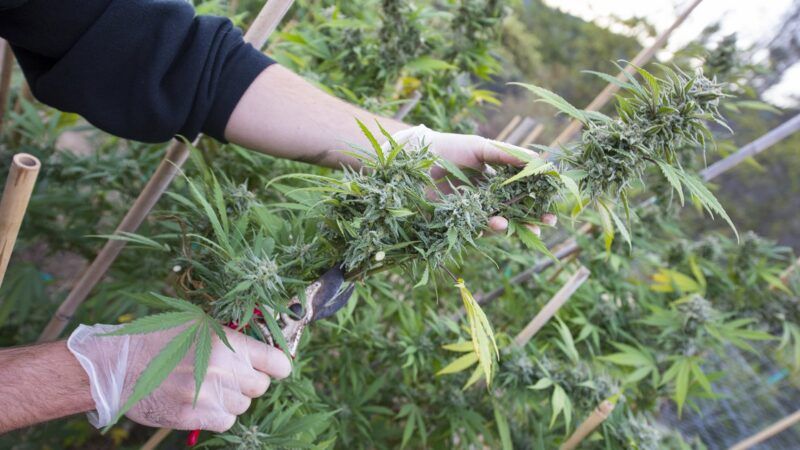Californians Learn That Raising Taxes on Marijuana Fuels Black Markets for Drugs
If only they would apply that lesson to other goods and services.

At the beginning of 2022, tax rates for marijuana cultivated in California are set to increase, even though black market sales completely dominate the retail market in the Golden State.
Experts estimate that about three-quarters of all marijuana sales in California happen not through legal dispensaries, but through unlicensed vendors. California voters legalized the cultivation and sale of marijuana for recreational use in 2016, but extremely high taxes and oppressive regulations have caused the rollout to be a disaster.
The tax increase set to hit on New Year's Day is a prime example. California taxes the cultivation of marijuana by weight. In the tax regulations that state lawmakers passed for cannabis in 2017, the cultivation tax rate was tied to inflation. When inflation rises, the cultivation tax will also automatically rise.
Inflation rose in 2021, and not by a small amount. The U.S. Bureau of Labor Statistics calculates that consumer prices rose nationally 6.8 percent between November 2020 and November 2021. Because of California's law, cultivation taxes will rise 4.5 percent. For growers of fresh cannabis plants, the cultivation tax will jump from $1.35 an ounce to $1.41 an ounce. On top of the cultivation tax, the state charges a 15 percent excise tax, and the cities that allow dispensaries have their own local sales tax rates. A person attempting to legally buy marijuana in California can expect the price to balloon between 35–50 percent through tax add-ons, depending on the city.
This, obviously, will make it all the more difficult for legal vendors to compete with the black market. That the increase is happening anyway is absurd and should be seen as a warning against automatically tying any tax rate to inflation.
Legal growers are rebelling, and some are reportedly talking about withholding their state taxes and demanding relief. They might actually have some leverage here, given the amount of energy that state and local law enforcement agencies are exerting by trying to shut down illegal grow operations. In October, Attorney General Rob Bonta bragged about a massive multi-agency operation that resulted in the eradication of 1.2 million illegally grown marijuana plants. Does Bonta also want to start going after legal growers who are protesting the state's absurd tax rates?
Before Bonta became California's attorney general, he was a Democratic assembly member representing the city of Alameda. Back then, he actually agreed with marijuana vendors that the state's tax rates were way too high. In 2019, he introduced legislation that would have reduced the state's excise tax and temporarily eliminated the cultivation tax until 2022. It didn't make it out of the committee stage. So while Bonta may now complain that illegal growers are "cheating the state out of millions of tax dollars," he knows (or at least used to know) that California's own high taxes are the real culprit here.
How bad are these marijuana taxes and regulations? High enough to cause the Los Angeles Times editorial board to thoroughly grasp—at least in this case—that oppressive government controls are what cause black markets. The board's Sunday editorial column sounds at least partially like something we might run here at Reason, though we'd leave out the demands for "ramping up enforcement" (we'd also probably edit out the handwringing over the environmental impact of illegal grow operations, which all seems to be a talking point for progressives and liberals to convince themselves that these giant drug busts are somehow different from ones launched by drug war advocates over the past four decades):
California can emerge from this marijuana mayhem by flipping the incentives. It's too easy and profitable to remain in the black market and too onerous and expensive to join the legal one. By easing licensing procedures or reducing taxes temporarily, and ramping up enforcement and penalties for illegal operators, the state has a better chance of coaxing fence-sitting operators to get licensed.…
Far too many cities and counties still ban cannabis businesses. Proposition 64 guarantees that right, which is why some advocates are floating the idea of another ballot measure to eliminate cities and counties' veto power over marijuana businesses. Local leaders have to acknowledge that refusing to recognize a now-legal industry is only encouraging the black market. Some localities are beginning to shift. Los Angeles County, for example, is considering revisiting its ban on pot shops in unincorporated areas.
I would invite members of the Times' editorial board to go back and look at how they've written about other taxes, like those on cigarettes and those proposed for soda. With marijuana, they grasp that too many taxes and regulations lead to a black market. But with cigarette and soda taxes, they're entirely certain that states and cities should jack them up. They're sure it will only lead to the thing that they want—fewer smokers and obese people—and not other unforeseen and negative consequences.
But we know that's not true. New York City has some of the highest cigarette taxes in the country. It also has a massive black market for cigarettes, accounting for as much as half of all sales. Cigarettes are to New York City what marijuana is to California. The absurdly high cost may have caused some people to quit, but it also made a market for bootlegging.
It's great that this marijuana disaster may be causing some leaders to rethink the state's high tax and regulatory burdens and their downstream consequences. But don't think they're unique to cannabis. It's just more noticeable because the legal cannabis industry is relatively new.


Show Comments (23)